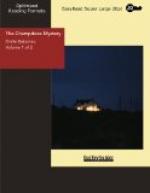Again the heart of Daumon overflowed with joy. All his deeply malignant spirit thrilled pleasantly as he heard these words.
“Marquis,” said he, “perhaps you will now believe with me that in all misfortunes there is an element of luck, for your father has committed an act of imprudence which will yet cost him dear. It is very strange that so astute a man as the Duke de Champdoce should have allowed his passion to carry him away.”
“What do you mean?”
“Simply that you can be freed from the tyranny of your father whenever you like now. We now have all that is necessary for lodging a formal plaint in court. We have sequestration of the person, threats and bodily violence by the aid of third parties, and words and blows which have endangered life; our case is entirely complete. A surgeon will examine your wound, and give a written deposition. We can produce plenty of evidence, and the wound on the head will tell its own story. As a commencement we will petition that we may not be ordered back to our father’s custody, and it will further be set forth that our reason for this is that a father has assaulted a son with undue and unnecessary violence. We shall be sure to gain the day, and—”
“Enough,” broke in Norbert; “will the decision give me the right to marry whom I please without my father’s consent?”
Daumon hesitated. Under the circumstances, it seemed to him very likely that the court would grant Norbert the liberty he desired; he, however, thought it advisable not to say so, and answered boldly, “No, Marquis, it will not do so.”
“Well, then, the Champdoce family have never exposed their differences to the public, nor will I begin to do so,” said Norbert decisively.
The Counsellor seemed surprised at this determination.
“If, Marquis,” he began, “I might venture to advise you—”
“No advice is necessary, my mind is entirely made up, but I need some help, and in twenty-four hours I require a large sum of money—twenty thousand francs.”
“You can have them, Marquis, but I warn you that you will have to pay heavily for the accommodation.”
“That I care nothing for.”
Mademoiselle de Laurebourg was about to speak, but with a gesture of his hand Norbert arrested her.
“Do you not comprehend me, Diana?” said he; “we must fly, and that at once. We can find some safe retreat where we can live happily, where no one will harm us.”
“But this is mere madness!” cried Diana.
“You will be pursued,” remarked the Counsellor; “and most likely overtaken.”
“Can you not trust your life to me?” asked Norbert reproachfully. “I swear that I will devote everything to you, life, thought, and will. On my knees I entreat you to fly with me.”
“I cannot,” murmured she; “it is impossible.”
“Then you do not love me,” said he in desponding accents. “I have been a thrice-besotted fool to believe that your heart was mine, for you can never have loved me.”




